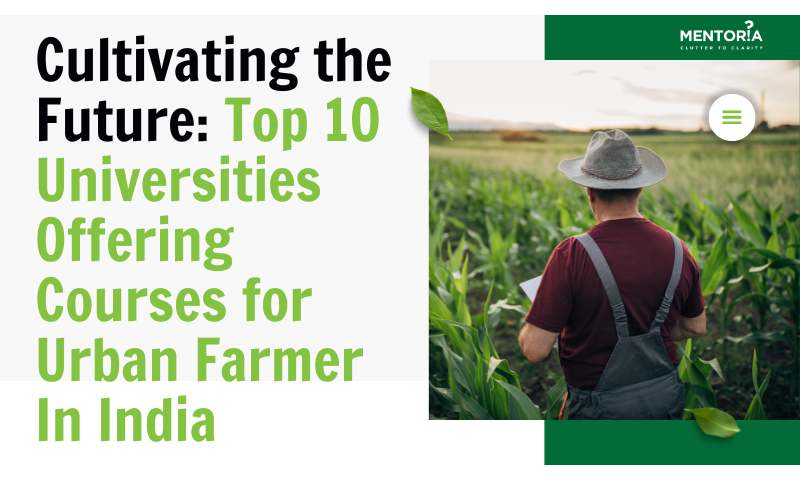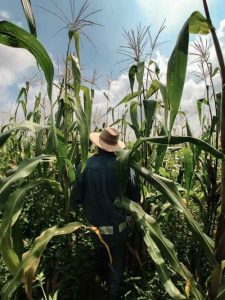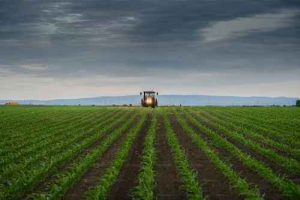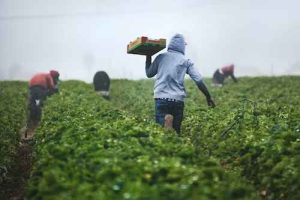Cultivating the Future: Top 10 Universities Offering Courses for Urban Farmer In India

Welcome to the world of urban farming, where concrete jungles transform into green oases and fresh produce is grown right in the heart of the city. If you have a passion for sustainable agriculture and want to become an urban farmer, this blog is your ultimate guide. We will explore the top universities and institutions in India and abroad that offer courses and programs in urban farming. Get ready to discover the exciting opportunities, future scope, and the impact of technology and AI in this field.
Institutions Offering Courses For Urban Farmers
Indian Agricultural Research Institute (IARI)
Located in New Delhi, the Indian Agricultural Research Institute (IARI) is a premier institution offering courses for aspiring urban farmers. The institute focuses on sustainable agriculture practices, urban horticulture, and rooftop gardening. The program equips students with the knowledge of organic farming techniques, soil management, and urban agriculture policy. The tuition fee for the program at IARI is approximately ₹50,000 per year, making it an affordable choice for students interested in pursuing urban farming.
- Ranking and Accreditation: IARI is ranked among the top agricultural research institutes in India. It is accredited by the Indian Council of Agricultural Research (ICAR).
- Intake: The intake at IARI varies depending on the specific program and academic year.
- Challenges: Some challenges faced by students at IARI include rigorous academic coursework, fieldwork requirements, and staying updated with the latest advancements in agricultural research.
- Benefits: IARI offers specialised programs, state-of-the-art research facilities, experienced faculty, and opportunities for hands-on learning and research.
- Course: IARI offers a course in Urban Farming and Sustainable Agriculture.
Wageningen University & Research, Netherlands
Wageningen University & Research, located in the Netherlands, is renowned for its expertise in agriculture and offers a specialised program in urban farming. The curriculum covers a wide range of topics, including urban agriculture techniques, resource management, and sustainable food production. Students have access to state-of-the-art facilities and hands-on learning experiences. The tuition fee for international students at Wageningen University is around ₹9,00,000 per year, reflecting the high-quality education and resources provided.
- Ranking and Accreditation: Wageningen University & Research is consistently ranked among the top universities worldwide in the field of agriculture and environmental sciences. It is accredited by the Dutch Accreditation Organization (NVAO).
- Intake: The intake at Wageningen University & Research varies depending on the program and the academic year. It is highly competitive.
- Challenges: Some challenges faced by students at Wageningen include the rigorous academic curriculum, research-intensive coursework, and adapting to the Dutch education system.
- Benefits: The university offers cutting-edge research facilities, renowned faculty, interdisciplinary programs, and a strong network of industry collaborations. It provides excellent opportunities for practical experience and research in urban farming.
- Course: Wageningen University & Research offers a Master’s program in Urban Environmental Management with a focus on sustainable urban development and food production.
University Of California, Davis
The University of California, Davis is a leading institution in agriculture education and research. Their program in urban farming emphasises urban horticulture, sustainable food systems, and urban landscape design. Students engage in practical training, community outreach, and research projects to develop a comprehensive understanding of urban farming practices. The tuition fee for the program is approximately ₹15,00,000 per year for international students, ensuring access to world-class education and opportunities.
- Ranking and Accreditation: The University of California, Davis is globally recognized for its excellence in agricultural and environmental sciences. It is accredited by the Western Association of Schools and Colleges (WASC).
- Intake: The university has a competitive intake process, and the number of students admitted varies by program and academic year.
- Challenges: Students at UC Davis may face challenges such as a rigorous academic workload, intense research requirements, and competition for research funding and internships.
- Benefits: UC Davis offers state-of-the-art research facilities, renowned faculty, industry partnerships, and a vibrant academic community. The university has a strong emphasis on sustainable agriculture and offers various opportunities for hands-on learning in urban farming.
- Course: UC Davis offers a Master’s program in Horticulture and Agronomy, with a specialisation in Urban Agriculture.
University Of Melbourne
The University of Melbourne offers a comprehensive course in urban horticulture and sustainable agriculture. Students delve into various aspects of urban farming, including community gardening, permaculture design, and urban food systems. The program combines theoretical knowledge with practical training, equipping students with the skills necessary for successful urban farming. The tuition fee for international students at the University of Melbourne is around ₹30,00,000 per year, reflecting the institution’s commitment to delivering high-quality education and research opportunities.
- Ranking and Accreditation: The University of Melbourne is a leading institution in Australia and is accredited by the Tertiary Education Quality and Standards Agency (TEQSA).
- Intake: The intake at the University of Melbourne varies by program and academic year. Admissions are competitive.
- Challenges: Students may face challenges such as a demanding academic curriculum, managing research projects, and adapting to the Australian education system.
- Benefits: The university offers world-class research facilities, distinguished faculty, a supportive learning environment, and access to industry connections. It provides opportunities for interdisciplinary studies and research in urban farming.
- Course: The University of Melbourne offers a Master’s program in Urban Horticulture.
Cornell University
Cornell University, located in the United States, provides a program in urban agriculture and food systems. Students explore topics such as urban soil management, urban livestock production, and urban farm business management. The program focuses on developing sustainable and resilient food systems in urban areas. The tuition fee for international students at Cornell University is approximately ₹35,00,000 per year, ensuring access to cutting-edge research facilities and expert faculty members.
- Ranking and Accreditation: Cornell University is a prestigious Ivy League institution with strong accreditation from the Middle States Commission on Higher Education.
- Intake: The university has a competitive intake process, and the number of students admitted varies by program and academic year.
- Challenges: Students at Cornell may face challenges such as rigorous coursework, research demands, and maintaining a balance between academic and practical experiences.
- Benefits: Cornell offers cutting-edge research facilities, renowned faculty, interdisciplinary programs, and a vast network of industry connections. It provides ample opportunities for experiential learning and research in urban farming.
- Course: Cornell University offers a Master’s program in Urban Horticulture.
University Of British Columbia
The University of British Columbia offers a program in sustainable agriculture and food systems with a focus on urban farming. Students gain hands-on experience through practical training, community engagement, and fieldwork. The program covers topics such as urban farming techniques, food security, and policy development. The tuition fee for international students at the University of British Columbia is around ₹25,00,000 per year, providing students with a diverse learning environment and opportunities for research and innovation.
- Ranking and Accreditation: The University of British Columbia is consistently ranked among the top universities globally and is accredited by the Northwest Commission on Colleges and Universities.
- Intake: The intake at the University of British Columbia varies by program and academic year. Admissions are competitive.
- Challenges: Students may face challenges such as a rigorous academic curriculum, research requirements, and adapting to the Canadian education system.
- Benefits: The university offers state-of-the-art research facilities, distinguished faculty, a diverse and inclusive community, and a strong focus on sustainability. It provides opportunities for experiential learning and research in urban farming.
- Course: The University of British Columbia offers a Master’s program in Sustainable Agriculture and Food Systems with a specialisation in Urban Agriculture.
National University Of Singapore
The National University of Singapore offers a course in urban agriculture and sustainable food systems. Students explore the integration of urban farming in urban planning, resource management, and food distribution. The program emphasises interdisciplinary learning and practical skills development. The tuition fee for international students at the National University of Singapore is approximately ₹20,00,000 per year, offering access to world-class facilities and a vibrant academic community.
- Ranking and Accreditation: The National University of Singapore is a top-ranked institution globally and is accredited by the Ministry of Education, Singapore.
- Intake: The intake at the National University of Singapore varies by program and academic year. Admissions are competitive.
- Challenges: Students may face challenges such as a demanding academic workload, research expectations, and adapting to the Singaporean education system.
- Benefits: The university offers world-class research facilities, esteemed faculty, a vibrant multicultural environment, and access to cutting-edge technologies. It provides opportunities for interdisciplinary studies and research in urban farming.
- Course: The National University of Singapore offers a Master’s program in Sustainable Urban Solutions with a focus on Urban Agriculture and Food Systems.
University Of Reading
The University of Reading, located in the United Kingdom, offers a specialised program in urban agriculture and food security. Students study the challenges and opportunities of urban farming, sustainable food production, and environmental management. The program combines theoretical knowledge with fieldwork and research projects. The tuition fee for international students at the University of Reading is around ₹25,00,000 per year, ensuring access to high-quality education and research opportunities.
- Ranking and Accreditation: The University of Reading is a renowned institution in the UK and holds accreditation from the Quality Assurance Agency for Higher Education (QAA).
- Intake: The intake at the University of Reading varies by program and academic year. Admissions are competitive.
- Challenges: Students may face challenges such as a rigorous academic curriculum, research expectations, and adapting to the British education system.
- Benefits: The university offers state-of-the-art research facilities, distinguished faculty, a supportive learning environment, and access to industry collaborations. It provides opportunities for hands-on learning and research in urban farming.
- Course: The University of Reading offers a Master’s program in Sustainable Agriculture and Food Security with a specialisation in Urban Agriculture.
Ghent University
Ghent University in Belgium provides a program in urban horticulture and green infrastructure. Students learn about urban food production, green space design, and sustainable urban development. The curriculum combines theoretical studies, practical training, and research projects. The tuition fee for international students at Ghent University is approximately ₹15,00,000 per year, offering a rich academic experience and exposure to European urban farming practices.
- Ranking and Accreditation: Ghent University is a prestigious institution in Belgium and holds accreditation from the Flemish Government.
- Intake: The intake at Ghent University varies by program and academic year. Admissions are competitive.
- Challenges: Students may face challenges such as a demanding academic curriculum, research requirements, and adapting to the Belgian education system.
- Benefits: The university offers cutting-edge research facilities, renowned faculty, a rich academic tradition, and a focus on sustainability. It provides opportunities for practical experience and research in urban farming.
- Course: Ghent University offers a Master’s program in Sustainable Agriculture with a specialisation in Urban Agriculture.
Technische Universität Berlin
Technische Universität Berlin in Germany offers a program in urban agriculture and urban ecology. Students explore the integration of farming practices in urban environments, sustainable food systems, and urban planning. The program combines theoretical knowledge with hands-on experiences and research projects. The tuition fee for international students at Technische Universität Berlin is around ₹10,00,000 per year, providing access to excellent education and research facilities.
- Ranking and Accreditation: Technische Universität Berlin is a prestigious technical university in Germany and holds accreditation from the German Council of Science and Humanities.
- Intake: The intake at Technische Universität Berlin varies by program and academic year. Admissions are competitive.
- Challenges: Students may face challenges such as a rigorous academic curriculum, research expectations, and adapting to the German education system.
- Benefits: The university offers state-of-the-art research facilities, renowned faculty, a dynamic learning environment, and a focus on innovation. It provides opportunities for interdisciplinary studies and research in urban farming.
- Course: Technische Universität Berlin offers a Master’s program in Urban Design and Sustainable Architecture with a focus on Urban Agriculture
Future Scope Of Urban Farmer Field
Career And Job Opportunities
The field of urban farming holds promising career opportunities for individuals passionate about sustainable agriculture and food production. As cities increasingly prioritise local food systems and environmental sustainability, the demand for urban farmers is expected to grow. Here are some future career prospects in the field:
- Urban Farm Manager: As the popularity of urban farming continues to rise, the need for skilled farm managers who can oversee operations, implement sustainable practices, and manage resources efficiently will increase. With experience and expertise, urban farm managers can earn competitive salaries, with an average pay range of ₹6,00,000 to ₹12,00,000 per year.
- Community Garden Coordinator: Community gardens play a vital role in promoting food security and community engagement. Coordinating and managing these spaces requires individuals with strong organisational and communication skills. Community garden coordinators can earn an average salary of ₹3,00,000 to ₹6,00,000 per year.
- Urban Agriculture Educator: Educating communities about urban farming, sustainable practices, and the benefits of local food production is crucial for the field’s growth. Urban agriculture educators can work in educational institutions, non-profit organisations, or government agencies. The salary range for urban agriculture educators varies from ₹3,00,000 to ₹8,00,000 per year.
- Urban Farm Consultant: With their expertise in urban agriculture, urban farm consultants offer guidance to individuals, businesses, and organisations interested in establishing and maintaining urban farms. Consultants can work independently or with consulting firms, earning an average salary of ₹5,00,000 to ₹10,00,000 per year.
- Agricultural Extension Officer: Agricultural extension officers play a crucial role in disseminating knowledge and providing technical support to urban farmers. They collaborate with farmers, conduct workshops, and facilitate the adoption of sustainable farming practices. The salary for agricultural extension officers ranges from ₹4,00,000 to ₹8,00,000 per year.
Growth Statistics And Percentages
The urban farming sector has witnessed significant growth in recent years, and its future prospects look promising. Here are some growth statistics and percentages showcasing the field’s potential:
- According to a report by the United Nations, by 2050, approximately 68% of the world’s population is projected to live in urban areas. This rapid urbanisation presents opportunities for urban farming to meet the increasing demand for locally grown food.
- The global vertical farming market is expected to reach a value of $12.77 billion by 2026, growing at a CAGR of 24.8% from 2021 to 2026. This indicates the growing adoption of innovative farming methods in urban environments.
- The demand for locally sourced and organic produce is on the rise, creating opportunities for urban farmers to supply fresh, high-quality produce to local markets, restaurants, and grocery stores.
- With advancements in technology and vertical farming techniques, urban farming is becoming more efficient and productive. This enables year-round cultivation, higher crop yields, and reduced water and resource consumption.
Entrepreneurship Opportunities
Urban farming offers excellent opportunities for aspiring entrepreneurs. Starting your own urban farm allows you to create a sustainable business model, cultivate unique crops, and cater to local markets. As an urban farming entrepreneur, you can establish community-supported agriculture (CSA) programs, supply restaurants and grocery stores, or even operate farm-to-table ventures. The potential for profitability and impact is significant, and entrepreneurial urban farmers can enjoy lucrative returns on their investments.
Specialisation And Innovation
Urban farming provides various avenues for specialisation and innovation. You can choose to focus on specific types of crops, such as microgreens, herbs, or specialty vegetables, catering to niche markets. Additionally, urban farmers can explore innovative techniques like hydroponics, aquaponics, or vertical farming to maximise productivity and resource efficiency. By specialising in specific crops or adopting innovative farming methods, urban farmers can differentiate themselves in the market and seize unique business opportunities.
International Opportunities In Urban Farming
The scope for international opportunities in urban farming is expanding. Many countries are embracing urban agriculture to address food security concerns, promote sustainable practices, and enhance urban livability. Regions like North America, Europe, and Asia are witnessing significant growth in urban farming initiatives, offering opportunities for professionals to work on international projects, research collaborations, or knowledge exchange programs. Exploring international opportunities allows urban farmers to gain diverse experiences, learn from different farming practices, and contribute to global efforts towards sustainable urban development.
Payscale At Various Levels
- Entry-Level Positions: As an entry-level urban farmer, you can expect to earn an average annual salary of around ₹3,00,000 to ₹5,00,000. These positions typically involve hands-on work in the field, assisting with crop cultivation, maintenance, and harvesting. While the pay may start at a modest level, it can increase as you gain experience and expertise.
- Mid-Level Positions: With a few years of experience and specialised knowledge, you can progress to mid-level positions in urban farming. Roles such as farm manager, crop specialist, or sustainable agriculture consultant offer higher salaries ranging from ₹6,00,000 to ₹10,00,000 per year. In these roles, you will have more responsibilities, overseeing farm operations, implementing innovative techniques, and managing a team.
- Senior-Level Positions: At the senior level, urban farming professionals can assume leadership roles, such as farm director, agri-business manager, or agricultural consultant. These positions command salaries upwards of ₹12,00,000 per year. As a senior urban farmer, you will be responsible for strategic planning, business development, and driving the overall success of the farm. Your expertise and experience will be highly valued, resulting in attractive compensation packages.
- Entrepreneurial Ventures: As an entrepreneur in the urban farming field, your earning potential can be significant. The income will largely depend on the size and success of your business. Successful urban farming ventures can generate annual revenues ranging from ₹50,00,000 to several crores. However, it is important to note that entrepreneurship entails certain risks and initial investments.
It’s worth mentioning that the pay scale in the urban farming field can vary based on factors such as location, farm size, market demand, and individual skills. With increasing awareness of sustainable food systems and the growing importance of urban agriculture, the demand for skilled urban farmers is on the rise, creating opportunities for both financial growth and personal fulfilment.
Which Countries Have Growth Perspectives?
India
India has a significant growth perspective for urban farming due to its large population and increasing demand for sustainable food production. The payscale for urban farmers in India can vary depending on factors such as location, farm size, and market demand. On average, urban farmers in India can earn anywhere between ₹3,00,000 to ₹12,00,000 per year, depending on their experience and scale of operations. The urban farming sector in India is expected to experience substantial growth in the coming years, driven by government initiatives, urbanisation, and the rising interest in organic and locally sourced food.
United States
The United States is a leader in urban farming and offers promising growth prospects. Urban farmers in the US can earn an average annual salary ranging from $30,000 to $80,000, which translates to approximately ₹22,00,000 to ₹58,00,000. The demand for locally grown and organic produce, as well as the increasing popularity of rooftop gardens and community-supported agriculture (CSA) programs, contribute to the growth of urban farming in the USA.
United Kingdom
The United Kingdom has witnessed a growing interest in urban farming, driven by sustainability and the desire for locally sourced food. Urban farmers in the UK can earn an average annual salary ranging from £20,000 to £40,000, approximately ₹19,00,000 to ₹38,00,000. With initiatives promoting urban agriculture and the focus on reducing carbon footprints, the demand for urban farming professionals is expected to increase in the UK.
Canada
In Canada, urban farming is gaining traction, particularly in urban centres like Vancouver, Toronto, and Montreal. The payscale for urban farmers in Canada varies depending on factors such as location and farm size. On average, urban farmers in Canada can earn an annual salary ranging from CAD 30,000 to CAD 70,000, approximately ₹17,00,000 to ₹39,00,000. The Canadian government’s support for sustainable agriculture and the increasing demand for locally grown food contribute to the growth of urban farming in the country.
Australia
Australia offers growth opportunities in urban farming, driven by a focus on sustainable agriculture and the desire for fresh, locally produced food. Urban farmers in Australia can earn an average annual salary ranging from AUD 50,000 to AUD 80,000, approximately ₹26,00,000 to ₹42,00,000. With the availability of rooftop gardens, community gardens, and innovative farming practices, urban farming is becoming a viable career choice in Australia.
These countries present favourable growth perspectives for urban farming, driven by factors such as sustainability, food security, and the increasing demand for locally sourced, organic produce. The pay scale mentioned above is an approximation and can vary based on various factors such as experience, farm size, and market conditions.
How Is Technology And AI Impacting The Urban Farming Field?
Smart Farming Systems
Smart farming systems are transforming the way urban farmers operate by integrating advanced technologies. These systems utilise sensors and IoT devices to monitor crucial environmental parameters such as temperature, humidity, and soil moisture. AI algorithms process the collected data, allowing urban farmers to make informed decisions and optimise their farming practices. By automating tasks and providing real-time insights, smart farming systems enhance productivity, resource efficiency, and crop quality in urban farming.
Vertical Farming And Hydroponics
Vertical farming and hydroponics have gained popularity in urban farming due to their space-efficient and resource-efficient nature. With the help of technology and AI, these systems can precisely control lighting, nutrient delivery, and climate conditions for optimal plant growth. AI algorithms analyse data from sensors to adjust parameters, ensuring the ideal growing environment. Vertical farming and hydroponics offer year-round cultivation possibilities and higher crop yields, making them an attractive option for urban farmers seeking sustainable and efficient farming methods.
Data Analytics And Predictive Modeling
The integration of data analytics and predictive modelling in urban farming enables farmers to leverage large amounts of data to make strategic decisions. By analysing data from various sources, such as weather forecasts, historical records, and sensor data, AI algorithms can provide valuable insights and predictions. Urban farmers can optimise crop selection, planting schedules, and pest control strategies, leading to higher yields and reduced risks. Data-driven decision-making enhances the overall efficiency and profitability of urban farming operations.
Indoor Farming Automation
Indoor farming facilities are utilising automation technologies driven by AI to streamline operations. Automated systems control lighting schedules, irrigation, and climate conditions to create an optimal growing environment for crops. AI algorithms continuously monitor and adjust these parameters based on real-time data, ensuring consistent and optimised conditions. By automating routine tasks, urban farmers can focus on other critical aspects of their operations, resulting in increased productivity and improved crop quality.
Farm Management Software
Farm management software platforms have emerged to support urban farmers in efficiently managing their operations. These software solutions provide features such as inventory management, crop planning, and sales tracking. They enable farmers to organise and analyse data, monitor key performance indicators, and streamline business processes. By integrating multiple aspects of farming operations into a centralised platform, farmers can make data-driven decisions, track expenses, and improve overall productivity. Farm management software enhances efficiency, reduces administrative tasks, and enables urban farmers to focus on sustainable and profitable farming practices.
Become An Urban Farmer With Mentoria!
As urbanisation continues to reshape our cities, the importance of urban farming grows. With the right education and training, you can embark on a rewarding career as an urban farmer. The universities and institutions mentioned in this blog offer excellent programs to equip you with the knowledge and skills needed for success in this field. As technology and AI continue to evolve, urban farming will become even more sustainable and productive, ensuring a greener and healthier future for urban communities. So, step into the world of urban farming and be a part of the movement that brings fresh and sustainable food closer to our cities.
We’re here to provide you with all the help! Kick-start your journey with Mentoria and discover the right fit for you. Feel free to call us to speak to our career mentors and choose the right guidance plan that suits your needs.
Mentoria’s career guidance programme enables you to choose your perfect fit from 3 streams, 850+ courses, and 12,000+ careers, and discover what will bring out the best in you.










